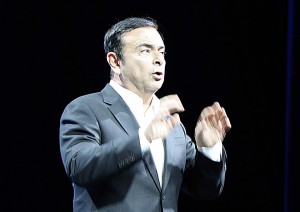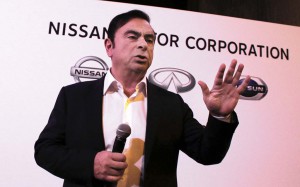Nissan is taking a “pragmatic” approach to dealing with a new president who may move to block automotive imports from Mexico, CEO Carlos Ghosn told TheDetroitBureau.com during a discussion at the annual Consumer Electronics Show in Las Vegas.
Ghosn’s comments came shortly after President-elect Donald Trump attacked Toyota in the latest in a series of tweets criticizing automakers who import vehicles into the U.S. from Mexico. That move sent the stock of the largest of the Japanese automakers tumbling. Nissan is the best-selling automaker in Mexico and has major assembly operations there supplying the U.S. and numerous other markets.
“We are pragmatic,” said Ghosn, who also serves as CEO of Nissan’s French alliance partner Renault. “We will adapt.”
The question, Ghosn stressed, is what will the new administration’s actual policies be on trade, whether from Mexico or other parts of the world?
Since launching his campaign, then-candidate Trump has repeatedly attacked America’s southern neighbor, among other things accusing it of sending some of its worst citizens across the border. (In a Friday morning tweet, hours after Ghosn’s appearance at CES, the president-elect insisted the U.S. will force Mexico to pay for a border wall.)

About 80% of the vehicles Nissan sells in the U.S. are assembled here, but it runs major assembly operations in Mexico, as well.
Early in the campaign, Trump also singled out Ford Motor Co. for plans to move small car production to a new plant in Mexico. On Tuesday of this week, Ford said it was canceling plans for that $1.6 billion factory. But as TheDetroitBureau.com reported, it will continue with plans to shift small car production to Mexico, instead squeezing that into an existing, underutilized assembly plant in Hermosillo.
(Ford scrubs Mexican plant – but still moving small cars to Mexico. Click Here for the story.)
On the same day, Trump took on General Motors, tweeting about the import of the Chevrolet Cruze from Mexico. “Make in U.S.A. or pay big border tax,” he declared. The fact that all Cruze sedans are built in Ohio, with only a few thousand Cruze hatchbacks coming from Mexico did not seem to matter.
On Thursday, the president-elect shifted his attack to Toyota, singling it out for its own Mexican imports and ignoring the vast, multi-billion-dollar factory network the company has established across North America over the last 30 years. That includes about a half-dozen U.S. assembly plants producing more than two-thirds of the vehicles it sells in the States.
(For more on Trump’s attack on Chevrolet, Click Here.)
While Nissan doesn’t have as many U.S. operations, it runs the single biggest assembly plant in the U.S., its Smyrna, Tennessee factory capacitized to produce 640,000 vehicles annually. According to a senior Nissan executive, about two-thirds of the record number of cars, trucks and crossovers the maker’s Nissan and Infiniti brands sold in the U.S. were assembled in the country in 2016.
But that may not matter to a new president whose recent tweets have suggested he may be trying to block any automotive imports from Mexico – a country that is now one of the five largest sources of vehicles in the world.
Numerous automakers approached by TheDetroitBureau.com said the real question isn’t what Trump is saying in his tweets but how that will actually translate into policy and law. The president-elect has so far suggested he may take several steps, from imposing a 35% tariff to renegotiating or even abandoning the North American Free Trade policy.
(President-elect turns sights to Toyota. Click Here for that story.)
What is equally uncertain is whether Trump, in office, will broaden his anti-auto import position to try to restrict vehicles produced in Japan, Korea, China, Europe and other parts of the world.
For now, automakers are taking a nervous, wait-and-see attitude. “We look forward to working with the new administration,” said Bob Carter, the Senior Vice President of Automotive Operations for Toyota in the U.S.
The potential shift away from largely open borders comes at an awkward moment for an auto industry that has been running at a record sales pace while also trying to adapt to one of the most dramatic shifts in the U.S. market in decades. Traditional passenger cars are rapidly losing ground to SUVs, crossovers, pickups and other light trucks that now account for nearly two-thirds of new vehicle sales.
Ford’s decision to move production of the compact Focus allowed it to free up a Michigan plant to build higher-demand – and higher-profit – trucks there. A number of automakers, including Hyundai and Nissan, are also in the midst of making strategic decisions about future product plans.
“Our concern is where to place new capacity,” said Ghosn. “For that decision, we have to understand what will happen, what will be the policy in the U.S.”
Trying to determine policy from a series of tweets issued by a president-elect still two weeks away from taking office has been difficult, Ghosn and other industry executives said this week. Those questions may not be fully answered until the new administration can settle in and begin to lay out a broader and more nuanced policy on trade.
Until then, many automakers appear to be putting in limbo their future product and production plans.


